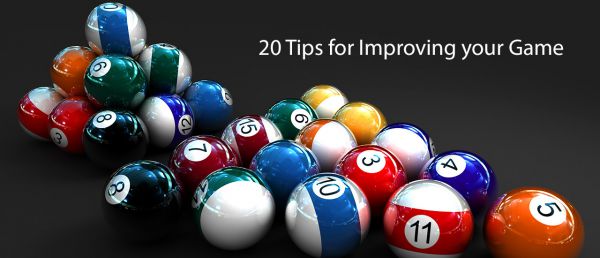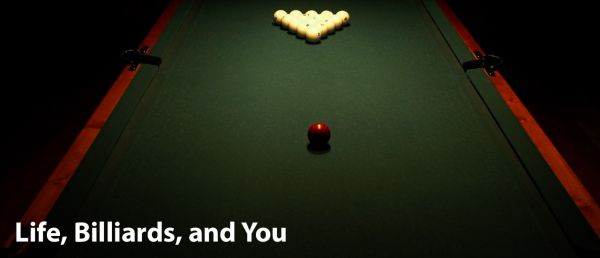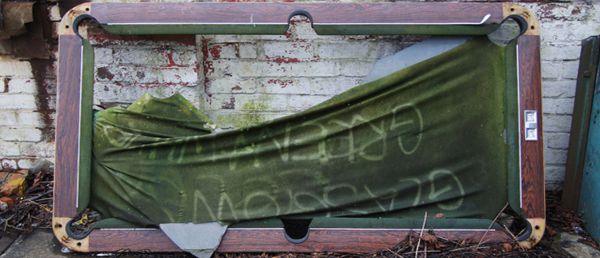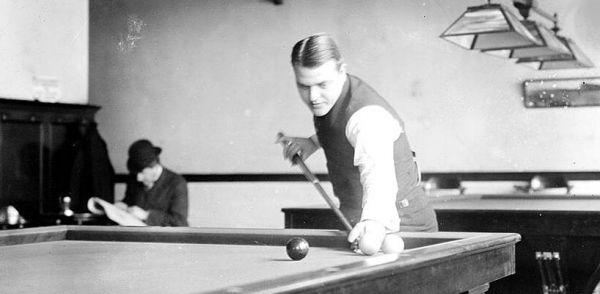
Tips for Improving your Billiard Game brought to you by our friends over at billiardz.com!
So, maybe you already know how to stroke a ball, and the difference between follow and draw. Your game can still go south on you in a hurry. Here are some tips to consider when you feel the need to make a few adjustments.
1. Every sport played with a ball demands balance, and that surely includes cue games. Precisely how you assume your shooting stance isn’t nearly as important as your being solidly planted – solid enough that you could resist a shove on your shooting side.
2. A stroke should be just that – a smooth, rhythmic motion with a beginning, middle and end. Don’t rush it, and don’t choke it off.
3. One of the key secrets to longer runs in pool is to leave yourself position for angled shots rather than straight-in shots. Angle shots offer you far, far more options for cue-ball position.
4. By all means, bet a few bucks. Morals, aside, you’ll learn to handle the game’s unique pressures much faster and much better.
5. The best way to learn position play is to strive to do whatever’s easiest (whenever possible; it won’t always be).
6. In all the cue games, you directly control zilch except for your body and your cue. (You affect the cue ball only indirectly, and the object balls far less than that.) When your game isn’t going well, your body mechanics are the first thing you should check.
7. When you need to send an object ball along the rail with speed, jacking up your cue slightly seems to help avoid “wiggling” the ball in the pocket jaws; it also eliminates throw.
8. Structured practice is much more valuable than the mere abstract hitting of loose balls. Practice 9-ball or straight pool, and/or some drills.
9. Mosconi’s No. 1 tip: Don’t waste your time with players who are worse than you; play with better competitors, and you’ll learn more.
10. Don’t hold the cue in your fingertips; it’s not a teacup. And don’t strangle the cue either; it’s not a baseball bat.
11. When contemplating where to send the cue ball next, make center table your first option.
12. The world does not come to an end when you miss a shot, or miss position, or lose a game or lose the session. Lighten up. You’ll enjoy yourself more, and win more often.
13. Your most formidable opponent by far in the cue games is the voice(s) in your head. Create a simple command or phrase to block out that interference, such as “Calm,” “Feel the ball,” or “Play your game.”
14. Chalk up before every shot, and do it right. The chalk should move, not the cue.
15. Don’t overhit the balls. It’s a definite symptom of anxiety, costs you accuracy, and is near-suicidal on any table with tough pockets.
16. The universal instruction concerning object balls frozen to the rail is false. Do not attempt to hit object ball and rail at the same time; you won’t even be close. Aim to hit the rail about a credit-card’s width in front of the ball.
17. Three to five practice strokes are plenty. More than that, and you force yourself out of rhythm, and begin to put unnecessary pressure on yourself.
18. Don’t hold onto your cue while you’re in the chair; the tendency is to squeeze it as your impatience grows, and this only produces more tension. Lean it securely next to you.
19. In assuming your shooting stance, you should line the shot up not with your hand or cue, but with your chin. It’s a smoother body move, and the rest will automatically fall into place. Putting your hand down first may result in tentativeness and an awkward, uncoordinated approach to the shot.
20. A good slump-breaker: Change your playing pace radically.
Source





